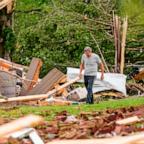Reduce Suffering, Urge Heart Failure Patients and Caregivers
April 24 -- FRIDAY, April 24 (HealthDay News) -- People with heart failure, and those who care for them, want more attention paid to their psychological needs, a new study finds.
"Heart failure patients and their caretakers suffer in a variety of ways," said Dr. David Bekelman, an assistant professor of medicine at the University of Colorado Health Sciences Center, who was to present the study Friday at an American Heart Association meeting in Washington, D.C. "They are interested in palliative care, reducing their suffering and improving their quality of life, and how such care could be provided."
Interviews with 33 people diagnosed with heart failure, which is the progressive loss of the heart's ability to pump blood, and 20 of their caregivers uncovered a desire for the kind of palliative care devoted to reducing suffering that is commonly given to people with cancer, Bekelman said.
"We asked them what was most distressing about having heart failure, and what was most helpful for dealing with the condition," he said. "We asked about symptoms and how they dealt with them, what it is like to live with heart failure, whether they got anxious and worried."
Four major needs emerged from the interviews, Bekelman said. "They need help adjusting to the limitations imposed by heart failure," he said. "They wanted to know what they might expect in terms of progression. They wanted help in alleviating physical and emotional symptoms. And they wanted better communication with medical personnel."
Treatment of heart failure usually focuses on the medical aspects of the condition, Bekelman said. The group he leads is "still looking at understanding the different needs of patients and caregivers," he said. "Some caregivers are open to questioning for planning purposes. Some patients often are not interested in their prognosis."
Bekelman said he hopes to pilot a program to address the different needs of those with heart failure and their caretakers. If he can obtain funding, the program would start "sometime next year," he said.




